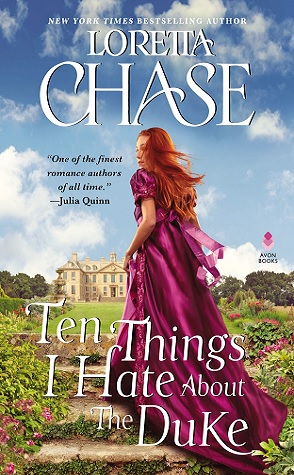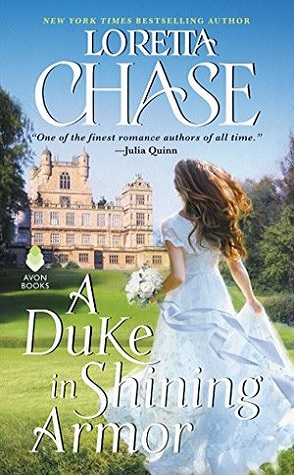Newland House, Kensington
Late forenoon of 11 June 1833
If the bride was drunk—which she wasn’t—it was on account of celebrating.
In a very little while, Lady Olympia Hightower was going to make all of her family’s dreams come true.
Hers, too, most of them.
She would become the Duchess of Ashmont.
Teetering on the brink of six and twenty, she ought to thank her lucky stars she’d won the heart . . . admiration
. . . something . . .
. . . of one of England’s three most notorious libertines, a trio of dukes known as Their Dis-Graces.
She narrowed her eyes at the looking glass. Behind gold-rimmed spectacles, eyes of a can’t-make-up-their-mind grey-blue-green took a moment to focus on the grandeur that was her. She. Whatever. Elaborate side curls of a commonplace brown framed her heart-shaped face. An intricate arrangement of plaits, topped by a great blossom of pleated lace adorned with orange blossoms, crowned her head. A blond lace veil cascaded over her bare shoulders, down over the full, lace-covered sleeves and on past her waist.
She looked down at herself.
Four knots marched down to the V of the waistline. Below that swelled full skirts of brocaded silk. A great waste of money, which would have been better spent on Eton for Clarence or a cornetcy for Andrew or something for one of the boys. Apart from his heir—Stephen, Lord Ludford—the Earl of Gonerby had five sons to support, a subject to which he’d given no thought whatsoever. His mind, unlike his daughter’s, was not practical.
Thus her present predicament. Which wasn’t a predicament at all. So everybody said. There was nothing predicamental about being a duchess. In any event, practicality had nothing to do with this bridal extravaganza. The money must be thrown away on Olympia, on a single dress, because, according to Aunt Lavinia, it was an investment in the future.
A duchess-to-be couldn’t wear any old thing to her wedding. The bridal ensemble had to be expensive and fashionable, though not flamboyantly so because a duchess-to-be ought to look expensively fashionable, though not flamboyantly so.
After the wedding was another matter entirely. A duchess could pour the entire contents of her jewel boxes over herself and never be overdressed. With a few adjustments, a different arrangement on her head, and more diamonds or pearls or both, Olympia would wear the dress to the next Drawing Room, when her mother or perhaps Aunt Lavinia, the Marchioness of Newland, would present the new Duchess of Ashmont to the Queen.
That wasn’t all that would happen after the wedding. There was the wedding night, which, according to Mama, would not be unpleasant, although she’d been rather vague regarding details. But after the wedding night came the marriage, years and years of it. To Ashmont.
The about-to-be Duchess of Ashmont picked up the cup of brandy-laced tea Lady Newland had brought to steady bridal nerves. The cup was empty.
“Do not even think of bolting,” her aunt had said when she delivered the doctored tea.
Certainly not. Too late for that, even if Olympia had been the sort of girl who backed down or ran away from anything, let alone the chance of a lifetime. She had six brothers. Being the second eldest child counted for nothing with boys. It was dominate or be dominated.
Some said she was rather too dominating, for a girl.
But that wouldn’t matter when she became a duchess.
She bent and retrieved from under the dressing table the flask of brandy she’d stolen from Stephen. She unstopped it, brought it to her mouth, and tipped in what she gauged as a thimbleful. She stopped it again, set it on the dressing table, and told herself she was doing the right thing.
What was the alternative? Humiliate the bridegroom, who’d done nothing—to Olympia, in any event—to deserve it? Disgrace her family? Face permanent social ruin? And all on account of what? The sick feeling in the pit of her stomach, which surely was nothing more than the usual wedding-day anxiety.
Only a lunatic would run away from becoming the bride of one of the kingdom’s handsomest, richest, most powerful men, she told herself. That was to say, Ashmont could be powerful, if he’d bother, but he . . . She lost her train of thought because somebody tapped at the door. “Please,” she said. “I’m praying.”
She’d insisted on time alone. She needed to collect herself and prepare for this immense change in her life, she’d told her mother and aunt. They’d looked at each other, then left. Soon thereafter, Aunt Lavinia had returned with the doctored tea.
“Ten minutes, dear,” came her mother’s voice from the corridor.
Ten minutes already?
Olympia unstopped the flask again and took another sip.
Nearly six and twenty, she reminded herself. She’d never get an offer like this one, ever again. It was a miracle she’d got this one. And she’d known what she was doing when she said yes. True, Lucius Wilmot Beckingham, the sixth Duke of Ashmont, was a bit of an ass, and so immature he made nine-year-old Clarence look like King Solomon. And yes, it went without saying that His Grace would be unfaithful.
But Ashmont was handsome, and he could charm a girl witless when he set his mind to it, and he’d definitely set his mind to charming her. He seemed to like her. And it wasn’t as though any great shocks were in store for her. His character was well known to anybody who read the gossipy parts of the fashionable periodicals.
The important thing was, he’d asked. And she was desperate.
“A duchess,” she told the looking glass. “You can practically change the world, or at least part of it. It’s as close as a woman can come to being a man, unless she becomes the Queen—and no mere consort either, but Queen in her own right. Even then . . . Oh, never mind. It’s not going to happen to you, my girl.”
Somewhere in Olympia’s head or maybe her heart or her stomach, a snide little voice, exactly like her cousin Edwina’s, said, “The Love of a Lifetime is never going to happen to you, either. No Prince Charming on his white charger will come for you. Not even a passionate lord. Or a shop clerk, for that matter.”
She suffocated the voice, as she had wished, many times, to suffocate Cousin Edwina. The Olympia who’d entertained fantasies of princes and passionate gentlemen had been a naive creature, head teeming with novel-fed romantic fantasies as she embarked on her first London Season. For seven years, she’d been voted Most Boring Girl of the Season. In seven years, she’d received not a single offer. That was to say, she’d received no offer any young lady in her right mind, no matter how desperate, would accept or, as had happened in the case of an elderly suitor, would be allowed to accept. And so, when Ashmont had asked, what could she say?
She could say no, and face a future as an elderly spinster dependent on brothers who could barely support themselves and their own families. Or she could say yes and solve a great many problems at once. It was as simple as that. No point in making it complicated.
She took another sip of brandy. And another.
There came louder and more impatient tapping at the door. “It’s the right thing to do and I’m going to do it,” she whispered to her reflection, “because somebody has to.”
She took another swig.
 Reviewer: Holly
Reviewer: Holly 






